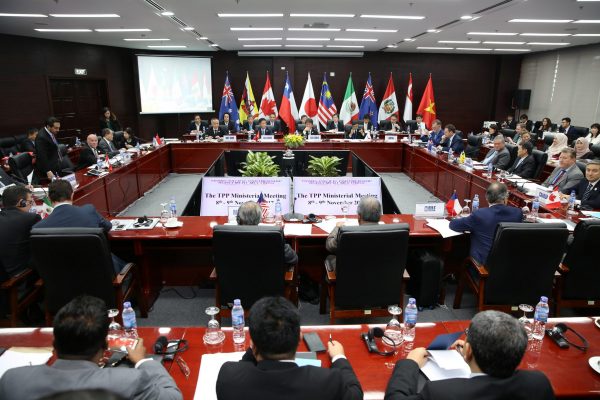But the rising nationalist and protectionist tide in the West is not a foregone conclusion. A series of mitigating factors are impelling the great powers to cooperate, if only instrumentally and in the short term.
While retaliatory trade behaviour against possible US protectionism might be an issue, the more fundamental risk is if countries repudiate global norms and institutions that underpin the globalised economy. This is possible if they feel that the United States is no longer committed to upholding the liberal economic order or to shouldering its burden.
There is also concern over whether China will honour the commitments it has made. These include accepting imported manufactured products and services as well as fully implementing the Agreement on Trade-Related Aspects of Intellectual Property Rights, as Beijing promised to do when China joined the WTO in 2001. Finally, there are concerns about the challenge of the various types of ‘covert’ protectionism rampant in China and other emerging markets.
Recent developments suggest that Trump has been forced by unanticipated events to delay or defer the pursuit of his anti-liberal agenda. His administration has made a series of abrupt reversals on foreign policy, such as revising his earlier opinions about NATO, US involvement in Syria, burden sharing by US allies, the One China policy and US involvement in the South China Sea. Trump has also retreated from intended protectionist moves toward China because Chinese cooperation is sorely needed to manage North Korea.
Trump has gone from accusing China of being the ‘grand champion’ of currency manipulation to declaring Beijing has not manipulated the Chinese currency in months. Since initially proposing a 45 per cent tariff on Chinese goods for allegedly hollowing out US manufacturing, the administration has gone quiet. Crucially, Trump has also expressed strong support for bilateral free trade deals.
Whether this retreat from protectionism and isolationism is a temporary move remains to be seen. After all, Trump appears to maintain his preference for transactional approaches. This was apparent during the Trump–Xi summit, where both leaders reportedly deliberated with ‘a cold calculation of interests’ as they exacted concessions from each other while still acknowledging their interdependence. These are the quid pro quos that embody transactional diplomacy. Yet by acknowledging mutual dependence, even if only on a transactional basis, a slide towards full-blown protectionism has been kept at bay.
In the face of these anti-globalisation pressures, can East Asian regionalism provide a bulwark for the liberal international economic order?
East Asian regionalism emerged and evolved within the liberal international order. An earlier emphasis on the preservation and protection of neutrality has given way in the post-Cold War period to open regionalism: a broad-based preference for extensive and deep engagement with external powers and access to outside markets and resources.
Open regionalism is meant to be inclusive. It seeks to incorporate outside powers such as the United States and other eastern Pacific Rim countries into regional forums such as the Asia-Pacific Economic Cooperation (APEC) trade forum and the ASEAN Regional Forum. Belief in such inclusivism and the perceived need to construct a stable regional balance of power to counter possible hegemonic ambitions led to a push to enlarge the membership of the East Asia Summit beyond ASEAN+3 countries.
Open regionalism also encourages groups to complement — not replace — institutional arrangements and practices in other parts of the world. For example, concerns that the Chiang Mai Initiative reserve currency pool would surpass the International Monetary Fund (IMF) as the region’s first port of call for critical financial assistance were dispelled when it became clear regional countries prefer either IMF assistance or bilateral swap agreements. Asian countries involved in territorial disputes have also looked to world bodies such as the International Court of Justice and the Permanent Court of Arbitration or relied on bilateral — not ASEAN-based — dispute settlement mechanisms.
Open regionalism inherently and intuitively liberalises trade and refutes protectionism.
In the spirit of East Asian regionalism (and in the aftermath of the US withdrawal from the TPP) Australia and Japan have emerged as the loudest voices in favour of an 11-member TPP trade deal minus the United States without ruling out the possibility of the latter’s return to the fold. Meanwhile, some are hoping that RCEP will launch by the end of 2017, though the best possible outcome is likely to be a framework agreement. APEC supports a third trade pact (the Free Trade Area of the Asia-Pacific) but it remains at the consultative stage despite receiving strong support from China when it chaired the 2014 APEC summit.
Despite the present uncertainty surrounding regional trade deals like the TPP and RCEP, East Asia’s shared commitment to open regionalism makes East Asian regionalism an important counter-narrative and alternative model to the isolationist and protectionist zeitgeist. This is perhaps the most important role that East Asian regionalism can and hopefully will play in the future: as a bulwark against the anti-globalisation tide reinforcing a liberal message.
See Seng Tan is Professor of International Relations at the S. Rajaratnam School of International Studies (RSIS), Nanyang Technological University and is concurrently Deputy Director and Head of Research of the Institute of Defence and Strategic Studies at RSIS.
The original version of this article was published here in JPI PeaceNet.

